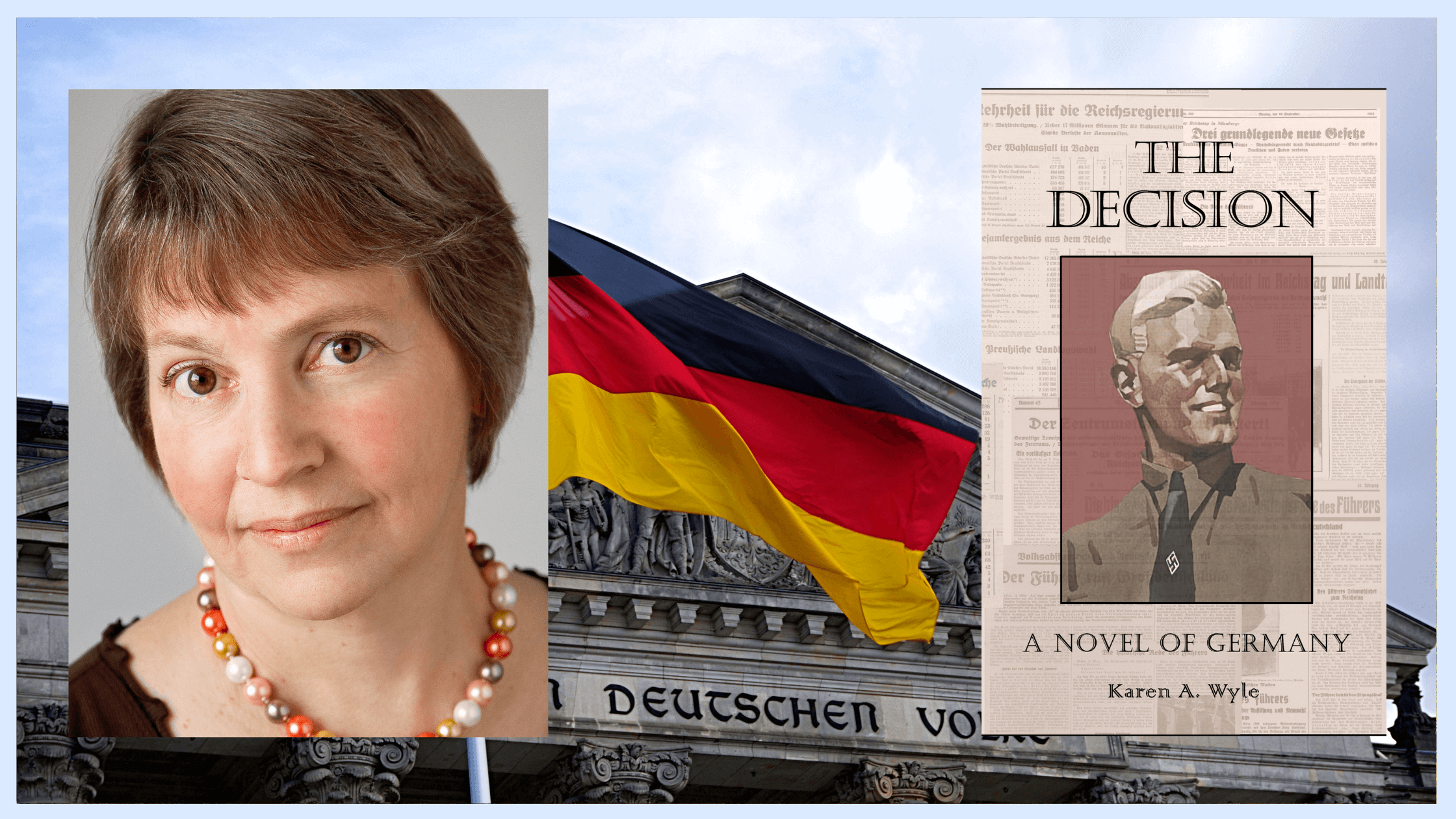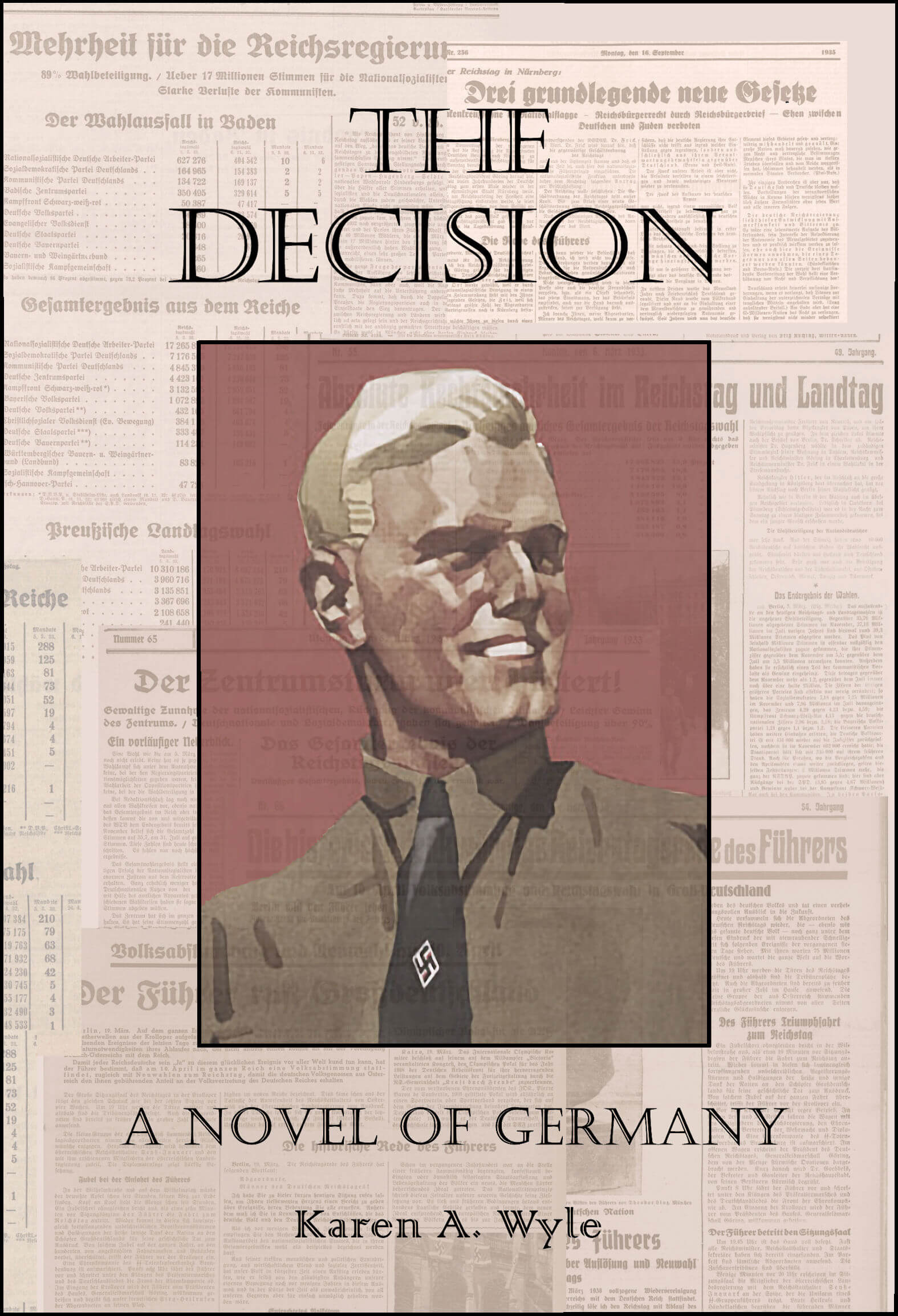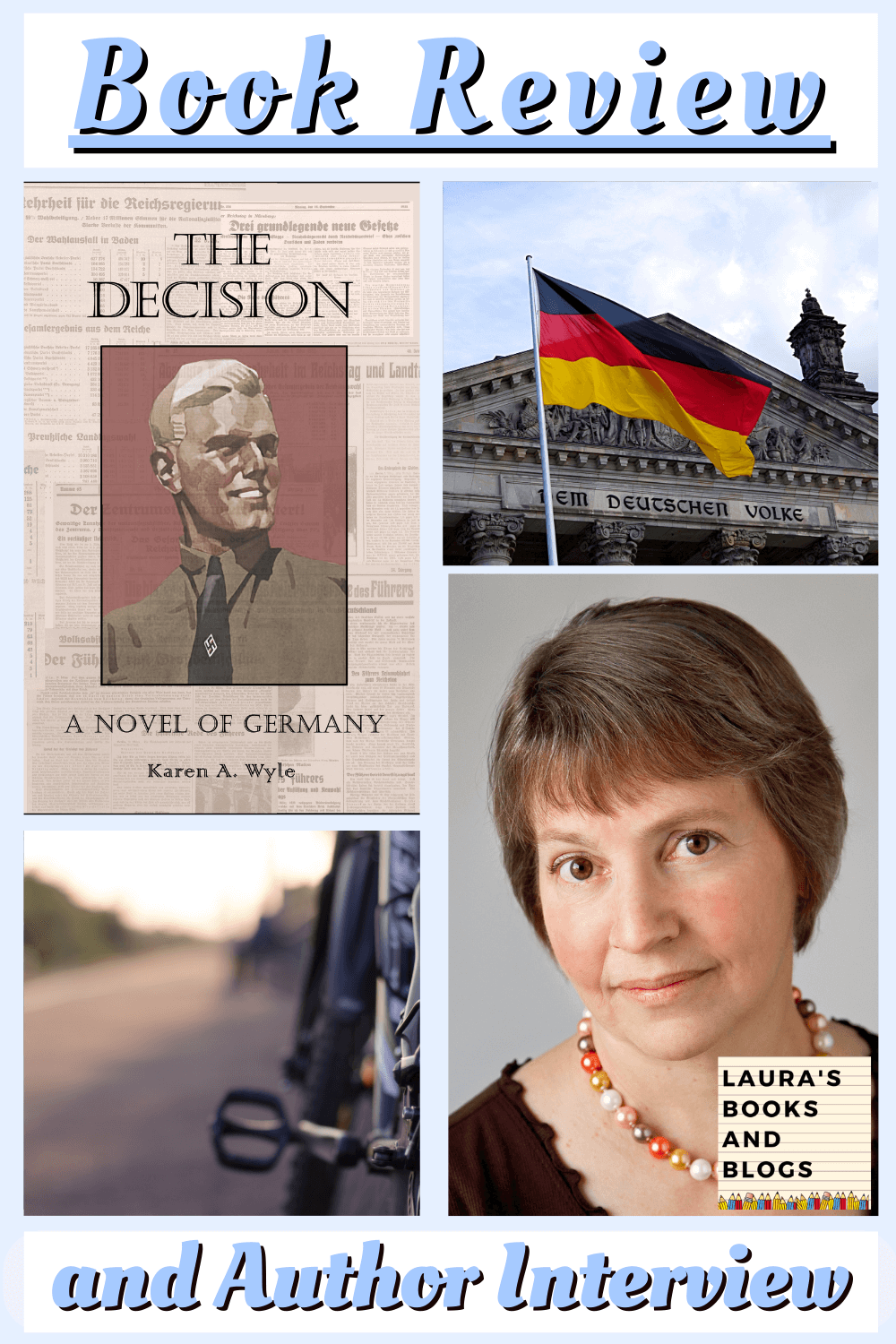
There’s a scene in Steven Spielberg’s The Fabelmans in which his main character, Sammy, is caught crashing his toy trains over and over again, fueled by the fear of having watched a train crash in a movie that he had recently seen in a theater. To remedy this, his mom allows him to film the train crashing so that he can play it back over and over again without damaging his toy trains.
This is a great analogy for what writers, and readers, do. We explore the same types of conflicts over and over again, watching them crash and analyzing each impact, trying to make sense of it, and, even, attempt to control it.
Author Karen A. Wyle has conducted her own literary experiment by taking a historic family story and expanding it out into a fictionalized life story that culminates in that tale which not only shaped her family’s history but her own personal existence in her historical fiction novel, The Decision/A Novel of Germany. Below is my review of The Decision followed by an interview with Wyle about her book.
The Decision plot summary
The story opens in Berlin 1938 with a bicycle accident involving three young Jewish boys and an elderly man. A German police officer intervenes. However, his actions are seemingly out of character for a man under orders to arrest or at least harshly punish Jewish citizens of any kind.
The story then backtracks to this police officer’s early life. As a young boy, Hansi lives with his mother, older brother, and younger sister while his father is away fighting in World War I. Times are tough, and the family is often on the brink of starvation. When his father returns home from war, times seem to get even tougher. However, his father is banking on a new political figure named Adolph Hitler to change the struggling country for the better.
As Hans ages, he pursues his dreams of becoming a police officer and a boxer. He meets a girl, gets married, and has a family. He supports his family despite their differing lifestyles and political viewpoints, and he remains conflicted about what mindset he chooses to follow. This all culminates into the bicycle accident, and the author imagines three different outcomes that could have transpired.
The story
The Decision is a thorough yet well-paced story that covers a lot of ground in terms of plot, character development, and German history. We tend to focus stories from this era on the darkest days of the war, the concentration camps, and the clear-cut difference between the good guys and bad guys.
Instead, this story uses one family to illustrate how the events in Germany led to the history that we all learned in school and that some of us devour in the forms of books, shows, documentaries, and movies. It doesn’t try to explain away the brutality but instead attempts to make us aware of how cornered all German citizens were in terms of their own individual survival and how the antisemitism seeped into even its youngest residents.
The characters
The story centers around Hansi, later known as Hans, and his family, first his parents and siblings, and later his wife and children. Hansi is your typical rambunctious boy who has only ever known hard times. He learns to steal because he is hungry. He insults his classmate because he’s Jewish, and that’s what he has been told to do. But he also harbors a lot of guilt for these actions, and it leads him to develop compassion for others.
Hansi’s heroes are the local police. After two experiences in which the police helped him and his mother, Hansi decides that he wants to be a police officer.
However, once he is old enough to become one, Hansi finds that policing is not what it used to be. He finds himself pressured by his colleagues, superiors, and even his own father to patrol with an iron fist rather than with his humanity and to hinder instead of help.
Even a lack of action can stir up trouble for the police, forcing them to increase their brutal tactics in order to not be seen as a traitor to their country. And the author imagines multiple endings for Hans that could have served as consequences for his decision to let the boys on the bikes go.
My recommendation
I recommend The Decision to those who love historical fiction, stories that are told over multiple years, and character-driven tales from a more unique perspective. Wyle has a very straightforward yet detailed style of prose along with an ear for dialogue and a way of conveying the distinct voices of multiple characters.
You won’t come away from this story with a changed perspective but a more human one that shows that even the smallest acts of heroism can pay off in ways that might not influence the course of world events but will influence the course of an entire family tree. And these small, personal stories show us that there’s always something new to learn about human history and behavior.
My rating

An interview with Karen A. Wyle

I know you as a picture book author. Is this the longest story you’ve ever written, and what was the experience writing a full-length novel like as opposed to writing a children’s book?
While I started writing picture book manuscripts in 1991 (a year I can remember because I was pregnant with my eldest child), I was publishing novels years before I started looking for artists with whom I could collaborate on picture books. (My drawing skills are limited to so-so still life — my imagination and my hands don’t play well together.) My process for writing any kind of book sometimes involves numerous piecemeal revisions, but those revisions take much more time and effort for the novels.
As for the longest book I’ve written, a quick look at spine widths and word counts indicates it’s Water to Water, a science fiction novel that could be read as fantasy. (The aliens on the unnamed planet have never heard of other planets – thus the absence of a planet name – or of such planets’ inhabitants.) I’m not including my one nonfiction book, Closest to the Fire: A Guide to American Law and Lawyers, a big brick of a reference work.
You chose to write from the perspective of a minor supporting character in your family history instead of your own ancestors. What events led to that decision?
I’ve often been urged to base a novel on one of the many amazing stories in my family history. (The section “Epilogue – The Boys” in this novel briefly mentions a very few of them.) However, I didn’t feel comfortable putting words in the mouth or thoughts in the head of someone I knew and loved.
During a visit with my then-99-year-old uncle, I listened to him tell once again the story that begins this book, and I had a revelation. Here was a story I could tell about a man that none of us knew, the policeman whose unexpected decision probably made it possible for me to exist at all. I could imagine formative events that could have led to this man first becoming a Nazi storm trooper, and then declining to detain three Jewish boys when one of them had just caused a bicycle accident.
You include a section about your extensive research in the back of the book. What did a typical day of research look like? What was a historical fact, object, or practice that you didn’t know about beforehand that was included in the book? What process or resources do you most recommend for someone who is looking to write their own story from this era in history?
I don’t sit down and spend an entire day doing research (or anything else – I tend to flit, or rather stride or march, from one activity to the next all day). While I’m writing a novel, I keep a list of points on which I need to do more research sooner or later.
Sometimes I follow the scent right away, ending up in an hours-deep rabbit hole. Sometimes I wait until after I finish the rough draft. In either case, I usually start by Googling and end up reading some number of articles. I often track down and have email exchanges with reference librarians or museum staff. For this book in particular, I read more books than usual, some of them recommended by the professors of German history I contacted (seven professors in all).
I learned a great deal about the era and about what Germans went through during and after World War I. In addition, to list a few of many examples, I read about and included the German wedding custom of Polterabend, which involves smashing dishes the night before the wedding, the automated window displays to be found in downtown Berlin in 1928, and the rigorous requirements for young men hoping to become Berlin policemen during the Weimar Republic.
Readers will be able to decide for themselves whether my research methods are worth emulating. On that point as on any other aspect of writing, my one overarching “rule” is that no process works for everyone, and you must find out by trial and error what works best for you.
Each chapter notes the month/season and year as Hans begins his story as a young boy and grows into a man. How did you choose how to space out the events of the story, and how did you plot out Hans’ history as it related to world history?
I didn’t plot out the events or their spacing systematically. When writing my rough draft, I just wrote the scene that seemed to come next. I knew roughly when I wanted to start and more precisely when I needed to end up.
I continually checked when various events would have occurred and put together a timeline after I finished the draft. That led me to shift a few scenes around (if I’m remembering accurately, far from a given).

There are a wide range of perspectives featured throughout the book from those ranging from diehard Hitler fans to those who are outspokenly opposed to his policies, particularly when it comes to the treatment of Jewish citizens. Did you find it a challenge to balance these many voices throughout the book? Was it especially difficult to write the antisemitic characters, and, if so, how did you power through it?
When I first conceived of this book, the horrific October 7, 2023, massacres had not yet occurred, nor the (to me) baffling and infuriating large-scale anti-Israel demonstrations that came well before Israel began its military response. Diving into a draft would normally serve as an escape, but with this draft, things were more complicated.
I’m a little too good at walling off feelings, and I managed to put such a wall in place as I wrote those passages. I did sense feelings pressing to break down the wall at times.
The two perspectives you mention posed different challenges. Writing from an antisemitic point of view was more of a stretch, naturally, but when I could separate myself from my emotional reaction, it was a somewhat enjoyable exercise – a little like writing from the point of view of the sociopath in Playback Effect.
A lot of people have debated how to change this era of history. What inciting incident or historical moment do you think could have prevented the world events that follow the end of this book?
My husband, an excellent armchair historian, enjoys coming up with alternate-history scenarios, and he has at least two that answer this question.
- In our timeline, just after declaring war on Germany, Britain impounded two dreadnought battleships, still in British possession, that the Ottoman Empire had bought and paid for. The crew for one of the ships had even arrived in Britain to take over. The Turks did not take this well.
Germany took advantage of the situation by offering them a battle cruiser and its escort. Less than three months later, the Ottoman Empire joined the Central Powers. If Britain hadn’t reneged on its deal with the Empire, it’s likely the Empire would have stayed neutral or even (less likely) joined the Allies. This would have changed so much about the way the war proceeded that many key events in the rise of the Nazis might not have occurred.
One example: due to probable changes in who rose to power in the Empire, the man behind the Armenian genocide might not have been in place. We know that Hitler took note of the world’s indifference to that genocide.
- Germany used a voting system called strict proportional representation. For reasons it’d be a major tangent to go into, this system tended to give fringe parties an outsized amount of power in the Reichstag. The Nazis were thus able to get a sufficient number of representatives in the Reichstag that Hitler became a politically plausible choice for Chancellor.
The same system, adopted by Italy at the end of World War I, allowed the Fascist takeover there. If only these countries had used a better voting system!
Do you have a favorite character?
I’m quite fond of Hans’ little sister Lotte.
What do you most want readers to take away from The Decision?
I mainly want people to enjoy reading it, and to feel some suspense throughout the book even though they know from the start how the crucial scene plays out. (At the beginning, the scene is told from an omniscient-narrator point of view; near the end, the reader sees it from Hans’ viewpoint.) I also hope some readers come away from the book with a slightly greater willingness to believe that human actions stem from a complex interaction between many aspects of their lives and that the same person’s decisions can fall at different points along the moral-to-immoral and safe-to-brave spectrums.
Author Links
Links will open in a new tab.
Website
Goodreads
Read my reviews on Wyle’s other books as well as a guest post from Wyle with tips for working with an illustrator here!
Buy it!
Buy a copy of The Decision here, and help support local bookstores! This is an affiliate link, and I will earn a commission on any sales.
Pin it!



